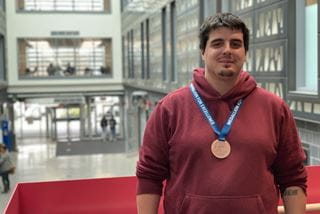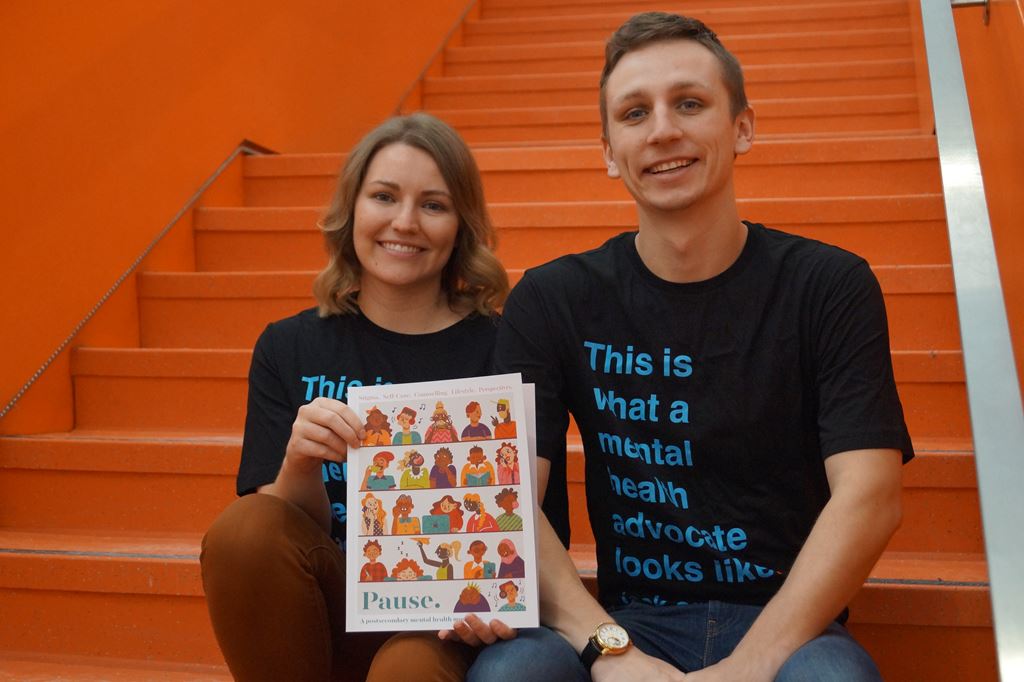
Young leaders working to transform mental health
 by Keiko Kataoka – Jan 30, 2019
by Keiko Kataoka – Jan 30, 2019 This is what a mental health advocate looks like.
It’s a tagline of Jack.org, a national organization that aims to empower young leaders to dismantle barriers to positive mental health in their communities. It’s also a statement embodied by the leadership of Ben LeBlanc and Brittany Tapper, both from Sheridan’s Honours Bachelor of Business Administration program, who together run the college’s own Jack.org chapter. In just over a year, they’ve made inroads in further reducing mental health stigma through outreach and campus events. In what will be their biggest undertaking yet, LeBlanc and Tapper are launching a postsecondary mental health magazine called Pause. on January 30 for Bell Let’s Talk Day.
“Jack.org is so effective in that it takes a bottom-up approach. It puts advocacy in the hands of youth.” – Ben LeBlanc
A peer-to-peer approach like that of Jack.org isn’t always leveraged in the landscape of mental health organizations, explains LeBlanc. “Administrators and health professionals are charged with creating programs for students and implementing them top-down, which can make students feel disconnected from the process,” he says. “Jack.org is so effective in that it takes a bottom-up approach. It puts advocacy in the hands of youth. As someone who’s struggled with mental health challenges in the past, I saw value in bringing Jack.org to Sheridan and its potential to help my peers.”
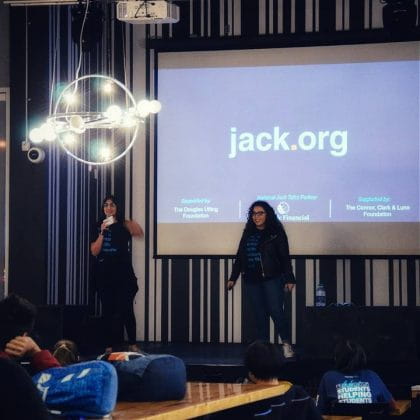
Even Jack.org wasn’t always the youth-centric organization that it is today. The parents of 18-year-old university student Jack Windeler created it after their son took his own life in 2010. Through their outreach efforts in the early years of the organization, they concluded that peer-to-peer, contact-based education would be the most effective way to reach young people. [i] Currently, Jack.org boasts a membership of 2,500 leaders across Canada.
Sheridan’s chapter is a small piece of the puzzle but an important one, especially at an institution with campuses in three Greater Toronto Area cities that serve a diverse population of students. “In our experience with Jack.org Sheridan, there’s a varying level of understanding regarding mental health amongst students,” says Tapper. “Some students haven’t ever had a conversation about mental health and don’t know how to access vital services. Others are looking for a platform to share their stories.”
To accommodate this range of engagement, the executive team of Jack.org Sheridan – made up of representatives from each campus – provides a variety of offerings. These have included a Jack Talk at Davis Campus in Brampton, a “Stressed Spelled Backwards” candy giveaway at the Hazel McCallion Campus, a forum to gain feedback on Sheridan’s Wellness and Counselling webpages, and opportunities for conversation and discussion around mental health at Orientation and Club’s Fair.
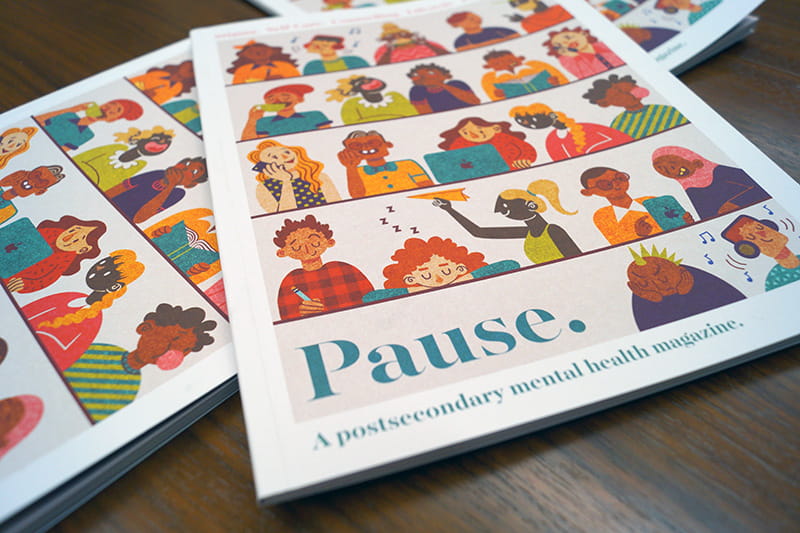
Although an official Sheridan Student Union Club, the efforts of Jack.org Sheridan have not gone unnoticed by staff. “More and more departments are becoming aware of what we’re doing,” says LeBlanc. “Not only are staff open to us providing insights to them based on our outreach with students on campus, but we are receiving unsolicited requests for collaboration.” One such opportunity came about when the Student Affairs Office was hiring a new Counsellor – a Jack.org Sheridan executive member was invited to sit in on the interview panel.
Another opportunity for Jack.org Sheridan to make a significant impact on campus came about with the creation of Pause. Tapper was inspired by wellness magazines she’d seen at the grocery store and recalled how students had been engaging with Jack.org Sheridan printed materials. “I can understand how the number of online resources can be overwhelming,” she says. “Pause. will allow people to engage with something tactile that contains a wealth of mental health information from both professional and personal sources. They can read it, come back to it, and share it with their friends. It offers a moment for themselves, free from technological distractions.” Three thousand copies of the magazine will be distributed across each campus for Bell Let’s Talk Day.
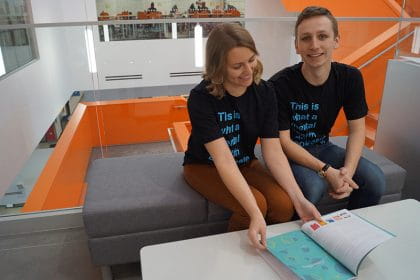
The publication is truly a multidisciplinary, highly-collaborative effort. Twenty-five students, staff members and faculty were involved in sharing their own experiences with mental health, student designers created visuals and Bachelor of Illustration alumna Kimberlyn Porter took the lead on the layout. There’s something in there for everyone. In addition to personal stories and interviews, the Centre for Indigenous Learning and Support offers a traditional wellness perspective, the Centre for Equity and Inclusion provides an inclusive language piece and there’s even a section dedicated to therapy animals.
“We’re committed to having real, peer-to-peer conversations that are open and honest and we hope it leads to reduced stigma and the removal of barriers to accessing help in all its forms.” – Brittany Tapper
More than 1,200 volunteer hours were spent creating Pause., indicative of just how important this tool is projected to be by those involved. “In the past, mental health has been primarily associated with professional sectors and only talking about it when you need professional help,” says Tapper. “While this level of care and treatment can be important, there will be instances where alternative supports are beneficial, especially since stigma surrounding mental health still exists. We’re committed to having real, peer-to-peer conversations that are open and honest and we hope it leads to reduced stigma and the removal of barriers to accessing help in all its forms.”
Should you ever need to access them, below is a list of mental health resources available to students:
- Visit Crisis Text Line or text HOME to 686868
- Crisis Outreach and Support Team (Coast) in Halton: 1-877-825-9011
- Crisis Support Peel Mobile Team: 905-278-9036
- 24/7 Postsecondary Student Helpline: 1-866-925-5454 or visit good2talk.ca
- Sheridan Student Union’s new service Empower Me
[i] https://jack.org/About/Our-History
Pictured at top of page: Alumna Brittany Tapper and student Ben LeBlanc posing with a copy of Pause. magazine on the stairs at Sheridan’s Hazel McCallion Campus. Photo by Keiko Kataoka.
Written by: Keiko Kataoka, Manager, Communications and Public Relations at Sheridan.
Media Contact
For media inquiries, contact Sheridan’s Communications and Public Relations team.



